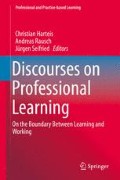Abstract
Research on workplace learning brings learning and working together and investigates the relationships between working and learning. Working and learning are determining factors of human activity, but are they in conflict with each other or is there a coincidence of working and learning? Where are the boundaries between working and learning and how can they be characterised? When discussing the boundary between learning and working, three questions arise: (1) How do boundaries become apparent? (2) Why should we cross these boundaries? (3) How can we cross these boundaries? This reader comprises attempts to approach these questions.
Access this chapter
Tax calculation will be finalised at checkout
Purchases are for personal use only
References
Brown, J. S., & Duguid, P. (1991). Organisational learning and communities-of-practice: Toward a unified view of working, learning, and innovation. Organization Science, 2(1), 40–57.
Cyert, R. M., & March, J. G. (1963). A behavioral theory of the firm. Englewood Cliffs, NJ: Prentice Hall.
Ericsson, K. A. (2006). The influence of experience and deliberate practice on the development of superior expert performance. In K. A. Ericsson, N. Charness, P. Feltovich, & R. R. Hoffman (Eds.), Cambridge handbook of expertise and expert performance (pp. 685–706). Cambridge, UK: Cambridge University Press.
Ericsson, K. A., Krampe, R. T., & Tesch-Römer, C. (1993). The role of deliberate practice in the acquisition of expert performance. Psychological Review, 100(3), 363–406.
Ogilvie, S. (2004). Guilds, efficiency, and social capital: evidence from German proto-industry. Economic History Review, 57(2), 286–333.
Senge, P. M. (1990). The fifth discipline: The art and practice of the learning organisation. New York: Doubleday.
Taylor, F. W. (1998). The principles of scientific management. New York: Harper. (Original work published 1911)
Womack, J. P., Jones, D. T., & Roos, D. (1990). The machine that changed the world. New York: Rawson.
Author information
Authors and Affiliations
Corresponding author
Editor information
Editors and Affiliations
Rights and permissions
Copyright information
© 2014 Springer Science+Business Media Dordrecht
About this chapter
Cite this chapter
Harteis, C., Rausch, A., Seifried, J. (2014). Discourses on Professional Learning: On the Boundary Between Learning and Working. In: Harteis, C., Rausch, A., Seifried, J. (eds) Discourses on Professional Learning. Professional and Practice-based Learning, vol 9. Springer, Dordrecht. https://doi.org/10.1007/978-94-007-7012-6_1
Download citation
DOI: https://doi.org/10.1007/978-94-007-7012-6_1
Published:
Publisher Name: Springer, Dordrecht
Print ISBN: 978-94-007-7011-9
Online ISBN: 978-94-007-7012-6
eBook Packages: Humanities, Social Sciences and LawEducation (R0)

